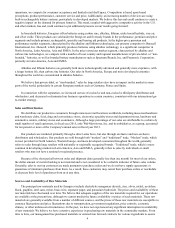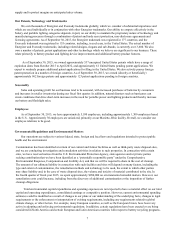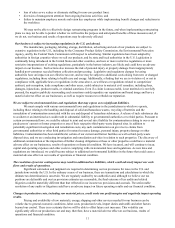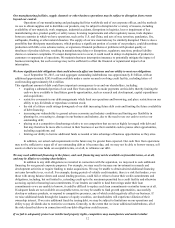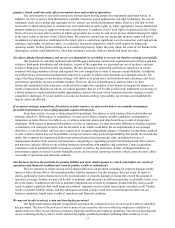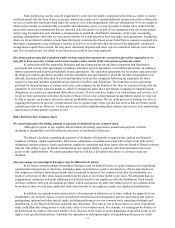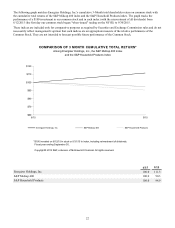Energizer 2015 Annual Report Download - page 20
Download and view the complete annual report
Please find page 20 of the 2015 Energizer annual report below. You can navigate through the pages in the report by either clicking on the pages listed below, or by using the keyword search tool below to find specific information within the annual report.16
or assets of Energizer, whether by merger or otherwise (and regardless of whether Energizer participated in or otherwise
facilitated the acquisition), (ii) other actions or failures to act by Energizer or any of Energizer’s representations or
undertakings in connection with the separation and the distribution being incorrect or violated. Any such indemnity
obligations could be material. In addition, we may incur certain tax costs in connection with the separation, including non-
U.S. tax costs resulting from separations in non-U.S. jurisdictions, which may be material.
We may not be able to engage in desirable strategic or capital-raising transactions due to the separation.
Under current law, a spin-off can be rendered taxable to the parent corporation and its shareholders as a result of
certain post-spin-off acquisitions of shares or assets of the spun-off corporation. For example, a spin-off may result in
taxable gain to the parent corporation under Section 355(e) of the Code if the spin-off were later deemed to be part of a
plan (or series of related transactions) pursuant to which one or more persons acquire, directly or indirectly, shares
representing a 50% or greater interest (by vote or value) in the spun-off corporation. To preserve the tax-free treatment of
the separation and the distribution, and in addition to Energizer’s indemnity obligation described above, the tax matters
agreement restricts Energizer, for the two-year period following the separation, except in specific circumstances, from: (i)
entering into any transaction pursuant to which all or a portion of shares of Energizer common stock would be acquired,
whether by merger or otherwise, (ii) issuing equity securities beyond certain thresholds, (iii) repurchasing Energizer shares
other than in certain open-market transactions, (iv) ceasing to actively conduct the Household Products businesses or (v)
taking or failing to take any other action that prevents the distribution and related transactions from qualifying as a
transaction that is generally tax-free, for U.S. federal income tax purposes, under Sections 355 and 368(a)(1)(D) of the
Code. These restrictions may limit Energizer’s ability to pursue certain equity issuances, strategic transactions or other
transactions that may maximize the value of Energizer’s business.
The terms we received in our agreements with our former parent could be less beneficial than the terms we may have
otherwise received from unaffiliated third parties.
The agreements we entered into with our former parent in connection with the separation, including a separation
and distribution agreement, a transition services agreement, a tax matters agreement, an employee matters agreement and
reciprocal trademark license agreements, were prepared in the context of the separation while Energizer was still a wholly
owned subsidiary of our former parent. Accordingly, during the period in which the terms of those agreements were
prepared, Energizer did not have an independent board of directors or a management team that was independent of our
former parent. As a result, the terms of those agreements may not reflect terms that would have resulted from arm’s-length
negotiations between unaffiliated third parties. Arm’s-length negotiations between our former parent and an unaffiliated
third party in another form of transaction, such as a buyer in a sale of a business transaction, are likely to have resulted in
more favorable terms to the unaffiliated third party.
We may be held liable to our former parent if we fail to perform certain services under the transition services agreement,
and the performance of such services may negatively impact our business and operations.
Energizer and our former parent entered into a transition services agreement in connection with the separation
pursuant to which Energizer and our former parent will provide each other certain transitional services, including treasury
and employee benefits administration, information technology, distribution and importation, regulatory and general
administrative services, on an interim, transitional basis. The fees we will be paid under the transition services agreement
may not be adequate to compensate us for the costs of performing the services. If we do not satisfactorily perform our
obligations under the agreement, we may be held liable for any resulting losses suffered by our former parent. In addition,
during the transition services periods, our management and employees may be required to divert their attention away from
our business in order to provide services to our former parent, which could adversely affect the business.
We have and expect to incur material costs and expenses as a result of our separation from our former parent, which
could adversely affect our profitability.
We have and expect to incur material costs and expenses greater than those we previously incurred as a result of
our separation from our former parent. These increased costs and expenses may arise from various factors, including
financial reporting, costs associated with complying with federal securities laws (including compliance with the Sarbanes-
Oxley Act of 2002), tax administration, and legal and human resources related functions, and it is possible that these costs
will be material to our business.
Transfer or assignment to us of certain contracts and other assets may require the consent of a third party. If such
consent is not given, we may not be entitled to the benefit of such contracts, and other assets in the future.
Transfer or assignment of certain of the contracts and other assets in connection with our separation from our
former parent require the consent of a third party to the transfer or assignment. In addition, in some circumstances, we are
joint beneficiaries of contracts, and we will need to enter into a new agreement with the third party to replicate the existing
contract or assign the portion of the existing contract related to our business.


